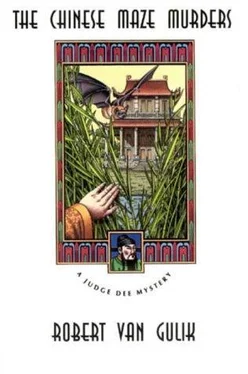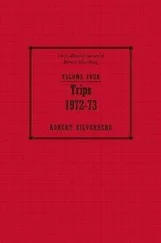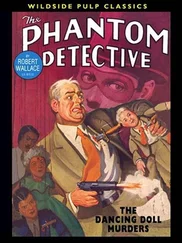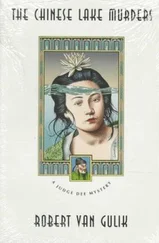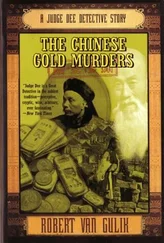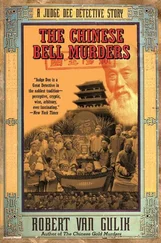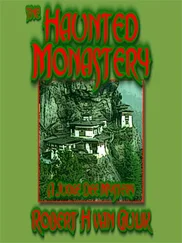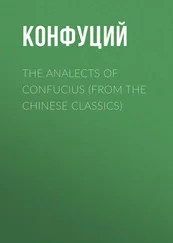Fang said with a sneer:
"Then we of Lan-fang were just unlucky! There was but one magistrate who, four years ago, turned against Chien. After two weeks his body was found on the river bank, his throat cut from ear to ear."
Judge Dee suddenly leaned forward. He asked:
"Was that magistrate's name by any chance Pan?"
Fang nodded.
"Magistrate Pan", Judge Dee continued, "was reported to the central authorities as having fallen in a skirmish with invading Uigur hordes. I was in the capital at that time. I remember that his body was forwarded there with military honours and that he was posthumously promoted to the rank of prefect."
"That was how Chien covered up his murder", Fang said indifferently. "I know the truth, I myself saw the body."
"Proceed with your story!", Judge Dee said.
"Thus", Fang went on, "my only son was forced to join the band of ruffians that Chien keeps as his private guards, and I never saw him again.
Then a wretched old crone who acts as procuress for Chien came to see me. She said that Chien offered ten silver pieces for White Orchid, my eldest daughter. I refused. Three days later my daughter went to the market, and never came back. Time and again I went to Chien's mansion and begged to be allowed to see her, but everytime I was cruelly beaten and chased away.
Having lost her only son and her eldest daughter my wife began ailing. She died two weeks ago. I took my father's sword and went to Chien's mansion. I was intercepted by the guards. They fell over me with their clubs, and left me for dead in the street. One week ago a band of ruffians set fire to my shop. I left the city with Dark Orchid, my youngest daughter who was also caught tonight, and joined a band of other desperate men out in the mountains. Tonight we made our first attempt at holding up travellers."
Deep silence reigned. The judge was going to lean back in his armchair but remembered in time that the back was broken. He hastily placed his elbows on the desk again. Then he spoke:
"Your story has a very familiar ring. It usually is some such tale of woe that robbers dish out in the tribunal when they have been caught in the act. If you lied, your head will fall on the execution ground. If it turns out that you have spoken the truth I shall reserve my verdict."
"For me", the blacksmith said dejectedly, "there is no hope left. If Your Honour does not have my head chopped off, Chien will certainly kill me. The same goes for my comrades, who are all victims of Chien's cruel oppression."
Judge Dee gave a sign to Chiao Tai. He rose and led Fang back to the jail.
The judge left his armchair and began to pace the floor. When Chiao Tai had come back, Judge Dee stood still and said pensivily:
"That man Fang evidently told the truth. This district is in the power of a local tyrant, magistrates are nothing but powerless figureheads here. That explains the queer attitude of the local population."
Chiao Tai hit his large first on his knee.
"Must we", he exclaimed angrily, "bow to that scoundrel Chien?"
The judge smiled his thin smile.
"The hour is late, he said, "you two had better retire and have a good night's rest. Tomorrow I shall have much work for you. I shall stay here for an hour or so and have a glance at those old archives."
Tao Gan and Chiao Tai offered to stay up for assisting the judge but he firmly refused.
As soon as they had left Judge Dee took up a candle and entered the next room. With the sleeve of his dirty travelling robe he rubbed the mould from the labels of the document boxes. He found that the most recent file was dated eight years before.
The judge carried this box into his office and spread out the contents on his desk.
It took his experienced eye but little time to verify that it were mostly documents relating to the routine of the district administration. On the bottom of the box, however, he found a small roll, marked "The Case Yoo versus Yoo". Judge Dee sat down. He unrolled the document and glanced through it.
He saw that it was a law suit concerning the inheritance of Yoo Shou-chien, a provincial governor who, nine years before, had died whilst living in retirement in Lan-fang.
Judge Dee closed his eyes and cast his thoughts back fifteen years, when he was serving in the capital as a junior secretary. At that time the name Yoo Shou-chien had been famous all over the Empire. He had been an exceptionally able and scrupulously honest official; devoted to the state and the people, he had earned fame both as a benevolent administrator and a wise statesman. Then, when the Throne appointed him Grand Secretary of State, Yoo Shou-chien had suddenly resigned from all his offices; pleading poor health he had buried himself in some obscure border district. The Emperor himself had urged him to reconsider his decision but Yoo Shou-chien had steadfastly refused. Judge Dee remembered that at that time this sudden resignation had created quite a sensation in the capital.
So Lan-fang had been the place where Yoo Shou-chien lived his last years.
Slowly Judge Dee unrolled the document once more, and read it carefully from beginning to end.
He found that when Yoo Shou-chien settled down to a life of retirement in Lan-fang, he was a widower of over sixty. He had an only son called Yoo Kee, then thirty years old. Shortly after his arrival in Lan-fang the old governor had remarried. He chose as his bride a young peasant girl of barely eighteen, of the surname Mei. Out of this unequal marriage there was born a second son, called Yoo Shan.
When the old governor fell ill and felt that his end was drawing near, he called his son Yoo Kee and his young wife with her infant son to his deathbed. He told them that he bequeathed a scroll picture he had painted himself to his wife and his second son Yoo Shan; all the rest of his possessions was to go to Yoo Kee. He added that he trusted that Yoo Kee would see to it that his stepmother and his half-brother would receive what was due to them. Having made this statement the old governor breathed his last.
Judge Dee looked at the date of the document and reflected that now Yoo Kee must be about forty, the widow nearly thirty, and her son twelve years old.
The document stated that as soon as his father had been buried, Yoo Kee expelled his stepmother and Yoo Shan from his house. He had said that the last words of his father evidently implied that Yoo Shan was an illegitimate child and that he was not bound to do anything either for him or for his adulterous mother.
Thereupon the widow had filed a complaint with the tribunal contesting the oral will, and claiming half of the property for her son, on the basis of common law.
At that time Chien had just established himself as the ruler of Lan-fang. It seemed that the tribunal had done nothing to settle this suit.
Judge Dee rolled up the document. He reflected that at first sight the widow did not have a strong case. The last words of the old governor together with the disparity in age of him and his second wife seemed to suggest that Mrs. Mei had indeed been unfaithful to her husband.
On the other hand it was curious that a man of such high ethical standards as the great Yoo Shou-chien had chosen this peculiar way of proclaiming that Yoo Shan was not his son. If he had really discovered that his young wife deceived him one would expect that he would have quietly divorced her, and sent her and her son away to live in some distant place, thus protecting the honour of himself and of his distinguished family. And why this queer bequest of the picture?
It seemed strange also that Yoo Shou-chien had not left a written testament. A man of his long official experience ought to have known that oral testaments nearly always engender bitter family quarrels.
This case had several angles that deserved a careful investigation. Perhaps it might also bring to light the key to the mystery of Yoo Shou-chien's sudden resignation.
Читать дальше
